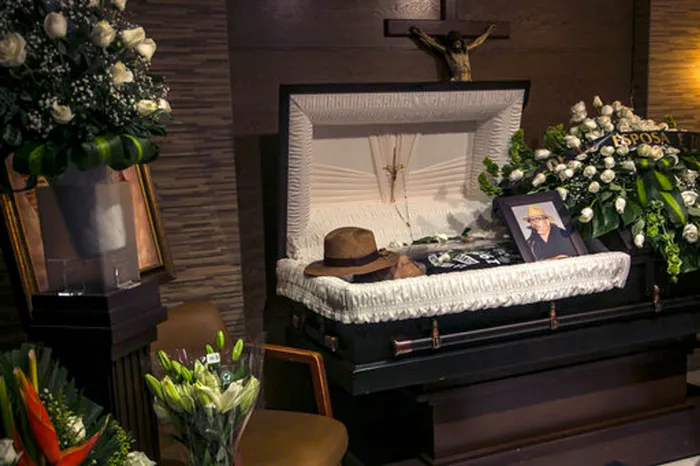Press freedom forum highlights pressures journalists face

The hat of murdered journalist Javier Valdez lays on his forehead inside a funeral home before his wake begins in Culiacan, Mexico, on May 16. AP Photo/Rashide Frias The hat of murdered journalist Javier Valdez lays on his forehead inside a funeral home before his wake begins in Culiacan, Mexico, on May 16. AP Photo/Rashide Frias
Turkish-born journalist Turkmen Terzi has been unable to visit his parents in two years after he was allegedly accused of being a terrorist.
If he sets foot in the transcontinental country, he has no doubt he will be arrested, imprisoned and tortured.
South Africa, he says, has since become his second home and that of his wife and their two young children, who were born in his idol Nelson Mandela’s rainbow nation.
However, like any child, despite the flecks of grey in his hair, he too yearns to hug his parents.
Asked when he would see them again, he shakes his head.
He is uncertain.
His was one of several stories recounted by international journalists on the opening day of the 69th World News Media Congress and 24th Editors’ Forum at the International Convention Centre in Durban.
The three-day event ends today. At the Press Freedom Round Table, journalists, editors and those championing the cause of a free press spoke frankly about being persecuted for holding governments and cartels to account.
It ended up being a cathartic experience.
Journalists, in their effort to report responsibly and ethically on underhandedness felt somewhat comforted as they related shared experiences.
But at the same time they were dispirited as story after story unfolded on how their trade and even their lives are increasingly coming under attack. In an effort to protect their craft, journalists encouraged their media colleagues to report on incidents where their neighbours are unjustly thrown behind bars for simply doing their jobs.
The public needs to to know, they said, so governments can be held to account.
Carol Beyanga, of the Daily Monitor in Uganda, said that in her country a new law was trumped almost every year aimed at curtailing the work of journalists.
“The law keeps getting tougher on the media.”
The minister of communications, she said, could make laws regarding journalists without it being passed in Parliament.
“But we still make a noise and do our work with those laws.”
According to Human Rights Watch (HRW), the Ugandan government has been accused of threatening and intimidating journalists, who reported critically about it, presented opposing political views, or exposed state wrongdoing, such as corruption or failure to investigate crimes, particularly in rural areas.
Furthermore, Uganda’s media regulatory system, HRW had claimed, is partisan and does not tolerate criticism of the governing party.
Ghias Aljundi, a human rights, media and capacity-building consultant in the Middle East and North Africa, added that many societies are not ready to except freedom of information.
“Journalism is not a crime,” he said.
Ryan Macasero, of Coconuts Media in the Philippines, said he had also faced threats but more so his female colleagues.
“There is no physical violence but emotional trauma.”
According to a report, scores of journalists have been killed in the past three decades in the Philippines, with radio broadcasters, who cover provincial politics, among the most common victims.
Other than the persecution and threatening tactics by some governments, aimed at curtailing media freedom, journalists lives are placed on the line by third forces.
Adriá López Ortiz, the CEO at Editorial Noroeste in Mexico, spoke on the murder of journalist Javier Valdez last month in the northern state of Sinaloa.
Valdez was known for his reporting on drug trafficking and organised crime.
This was reportedly the latest in a wave of journalist killings in what has been described as “one of the world’s most dangerous countries for media workers”.
He was at least the fifth journalist to be murdered in Mexico in just over two months.
Another high-profile journalist, Regina Martinez Perez, was found strangled in her home in 2012.
“As colleagues, and the younger journalists, there is a lot of fear. But maybe assassinations are the glue that pushes the state to do its work (curb the drug trade).”
Terzi, meanwhile, who came to South Africa in 2009 to cover the 2010 Fifa World Cup, and now resides in Joburg, said about 12 of his colleagues are in jail in Turkey, some for almost a year.
“I can travel there. I have my passport and visa, but if I go to Turkey, they can arrest me for criticising the current leader, Tayyip Erdoan. I can be tortured. It’s the worst jail of journalists.
“When corruption increases, politicians undermine the judiciary and they control it and they have the power to arrest journalists, who write about their corruption.”
Terzi is currently freelancing for Turkish publications in several countries, except Turkey